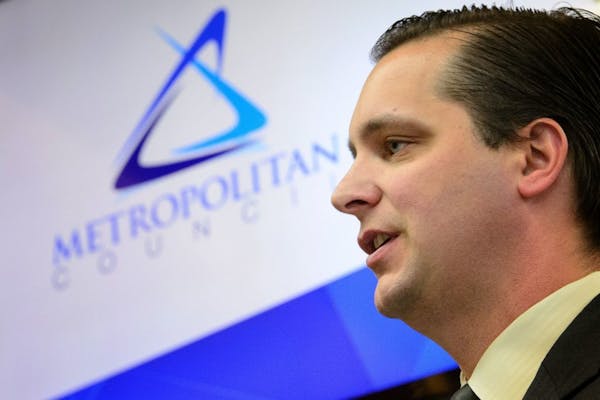A little-known financial tool may be considered to keep money going to the beleaguered $1.74 billion Southwest light-rail project — and it's provoking another round of controversy.
The Metropolitan Council is considering the use of "certificates of participation," a form of government financing, to keep the project afloat while legislators debate the $138 million needed in state funding for the transit project. Legislative support is uncertain, and the lack of state support could imperil critical federal funding for the 14.5-mile line linking Minneapolis to Eden Prairie.
The Met Council said the tool would only be deployed as a stopgap to bridge temporary cash-flow issues that may arise, not as a way to pay the state's entire share. And, they say, certificates would only be tapped as part of a broader financial plan for the project approved by lawmakers.
Rep. Tim Kelly questions the idea. The Red Wing Republican, who chairs the House transportation committee, wrote to the head of the Met Council in June asking whether the regional planning agency has the legal authority to issue certificates of participation for a transit project. The Met Council maintains it does.
After a follow-up meeting with Met Council Chair Adam Duininck last month, Kelly said last week he is still opposed to their use. "I am not a fan," he said. "It's just a creative way to say we need to acquire more debt without it being right out in the open. It's a transparency issue, it's very difficult for people to follow and understand."
The certificates are defined as "a special kind of revenue bond, with a fuzzy guarantee," said Jerry Zhao, an associate professor at the University of Minnesota's Humphrey School of Public Affairs. They are typically paid back with an expected source of revenue — in this case the Met Council may use motor vehicle sales tax money to back them.
Relatively new tool
Zhao says the financing tool is relatively new, and has been used quite a bit in California. Governmental bodies pressed for cash like the flexibility of the certificates; in some cases public hearings are not necessary, he said. Investors like them because they may carry a higher rate of return, though they do come with a higher level of risk compared with other bond investments.
The Met Council used $13.5 million in certificates of deposit to renovate its St. Paul headquarters in 2004. Minnesota issued $75 million in certificates to update the budget department's tax, accounting and procurement computer systems in 2009. And, $81 million of certificate financing was used for the controversial $90 million Senate office building at the Capitol.
It's not unusual for governments to use certificates for transit projects. Transit agencies in Los Angeles, New York and Denver have used certificates of participation to purchase buses, according to the American Association of State Highway and Transportation Officials, a Washington, D.C.-based transportation group.
Duininck said this week that the certificates would be used to keep the project on schedule, which is needed to secure federal funding. The Met Council is required to commit the state's 10 percent share by June 2016, or the federal match could be at risk, he said.
So far, various regional bodies have committed more than $750 million in local funds for the project, and the Met Council is seeking an $872 million match from the Federal Transit Administration.
There's enough money in the Southwest budget to keep it chugging along until the end of the legislative session next year, according to John Schadl, a Met Council spokesman.
In the throes of the recent legislative session, news that the cost of the Southwest line had increased $341 million to nearly $2 billion prompted the Legislature to cancel $29.7 million that had been previously appropriated to the Southwest project. Faced with a cash crunch, the Met Council quickly opted to draw $13 million from its motor-vehicle sales tax reserve account to cover some Southwest expenses.
Given the budgetary uncertainty, the Met Council has suggested using the certificates, but only "the amount necessary to cover cash flows," Duininck said.
Funding needed in 2016
In recent months, the Met Council pared $250 million from the project, and secured an additional $42.5 million in cash and land donations from cities along the line and Hennepin County, so it appears the project is back on track.
"The real challenge is to get full funding by the end of next year, and if the state share is not secured, we can't do that," said Duininck.
Duininck and Kelly met last month to discuss the use of the certificates, and both characterized the meeting as cordial. But Kelly said he's still not on board, and may reconvene the House transportation committee in coming months to discuss the situation. Duininck said that he would be happy to answer further questions.
"We didn't really discuss what it all means for the next [legislative] session," Duininck said. "Hopefully, we can work together with his colleagues to find a way to pay for it."
Meanwhile, the Southwest project is on schedule to complete 60 percent of engineering by the end of September. All told, $71.5 million has been spent on the line as of May 31, according to Metro Transit.
Janet Moore • 612-673-7752 Twitter: @MooreStrib

How Minnesota House Republicans ended the DFL's state government trifecta
Project 2025 platform proposal aims to allow mining in Boundary Waters watershed

Ann Johnson Stewart wins special election, giving DFL control of Minnesota Senate

Democratic U.S. Sen. Amy Klobuchar defeats GOP challenger Royce White

